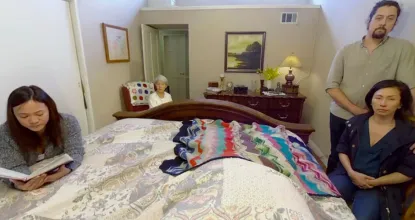
Northern’s School of Nursing has introduced virtual reality (VR) immersive experiences that allow students to embody patients confronting conditions such as macular degeneration, hearing loss, Alzheimer’s Disease and social isolation. In one particularly powerful scenario, they even get a first-person view of death through the eyes of a 66-year-old veteran named Clay with stage IV terminal lung cancer. Adopting a patient’s perspective promotes greater empathy and understanding. It is also an effective complement to the practical nursing skills students develop in the campus simulation labs with high-fidelity manikins that realistically mimic human body functions.
To better describe the end-of-life training module, this author put on a VR headset and inhabited Clay as he progressed from terminal diagnosis to home hospice and death. In all of the scenes, conversations about his condition swirled around him among family members, medical professionals and hospice staff. With Clay’s occasional input via phone message—the cancer had spread to his throat so he couldn’t speak—decisions were made about his care.
In the last segment, Clay is lying on his bed. He gazes down at the mottled skin on his hands and legs as his throat rattles. Both are common signs that “it’s time,” as the hospice nurse tells family members gathered around him. Suddenly there’s a shift to an out-of-body view from a high corner of the room that shows Clay with his wife cuddling up beside him, her arm draped over his still chest.
Before the pandemic, nursing professor Dr. Lisa Flood ’83 BSN, ’88 MSN piloted the use of two of the six VR training modules NMU obtained from the Embodied Labs company. She said the immersive experiences remind her of the movie about Patch Adams, the doctor who made medical students assume the role of patients to expand their insight and improve their empathy and communication skills.
“These VR experiences focus on students’ affective domain of learning, rather than starting an IV or performing other technical skills virtually,” Flood said. “It’s more immersive and cutting-edge than watching a video on a computer. While VR will never replace full-scale simulation labs, it can augment them. During nursing simulation labs, students make clinical judgments and practice psychomotor skills, but are still talking to a static manikin. The Embodied VR allows the student to experience health conditions and situations from the patient’s perspective, interacting with family and various caregivers in a 360-degree virtual environment that includes sight, sound and movement. Students who completed the simulations really liked them!"
“The only drawbacks are space, time and cost limitations. Because there are only a few VR stations and headsets at Olson Library, the experience cannot be an in-class activity, but we are exploring possibly using portable headsets capable of storing the software apps and have purchased a UV light machine for sanitizing the headsets after each use.”
May 2021 grad Annalise Wohlford completed a journey through the stages of Alzheimer’s as a patient named Beatriz, a teacher. She first realizes something is wrong when she has trouble doing a simple math problem at the chalkboard. Later, she develops muddled hearing and the loss of vision and purposeful movement. Wohlford could sense Beatriz’s frustration related to both her communication challenges and her family’s disagreements about her care.
“As a nursing student, you learn about these conditions in classes, but to actually embody the person having these symptoms or issues changes the game,” she said in an interview shortly after the training. “It’s interesting to learn how to better care for the family as they deal with a family member getting Alzheimer’s. It’s a different type of care, in a sense. You understand people aren’t capable of doing certain things.”
Other NMU nursing faculty have also used the Embodied Labs modules. The company originally developed them for professional training rather than education, so their learning effectiveness and outcomes have yet to be measured. But Flood predicts VR simulations will definitely become viable instructional technology tools for the future.